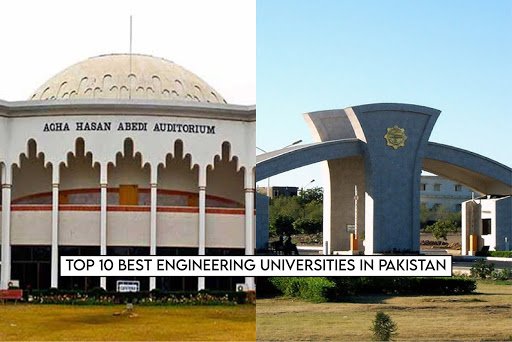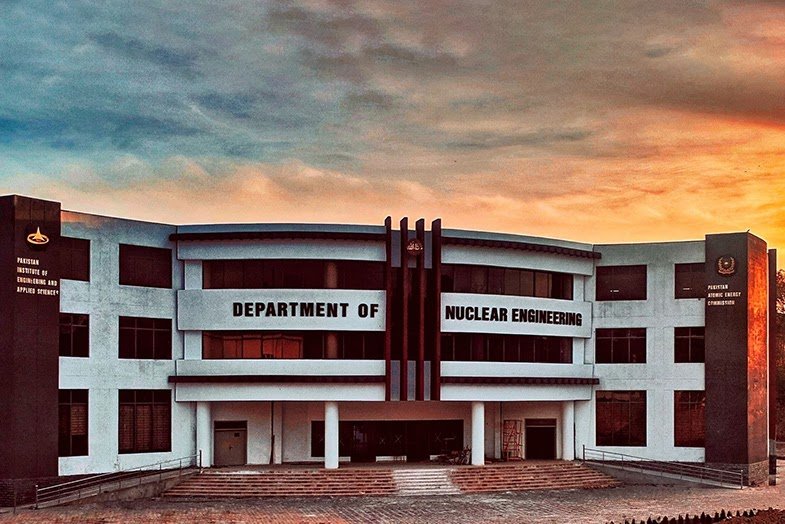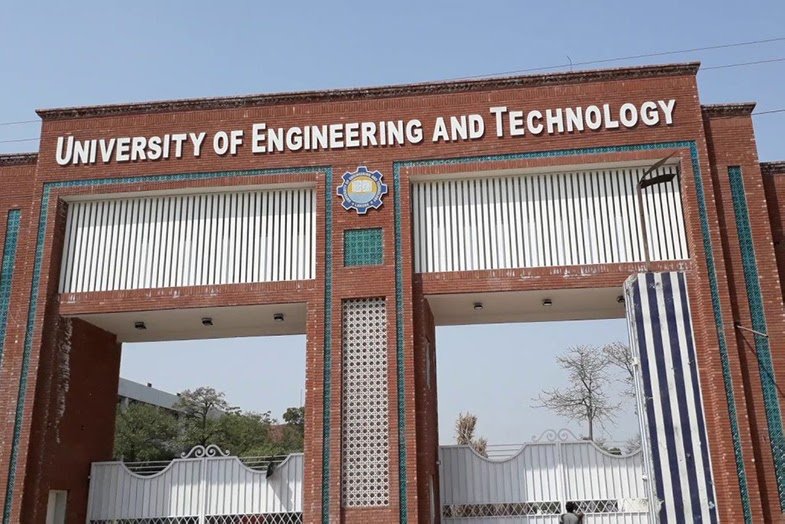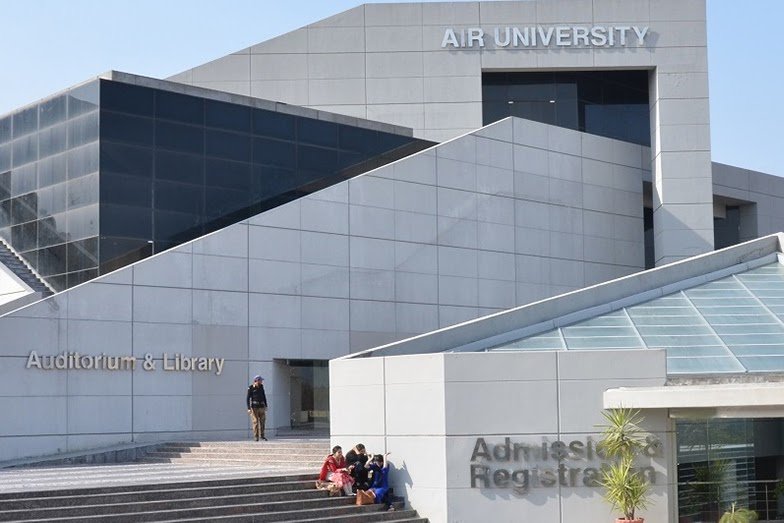
As time has progressed and Pakistan has aged, numerous engineering universities have sprung up. The oldest university was established in 1921 and it sought to educate students in multiple engineering disciplines including mechanical engineering, electrical engineering, civil engineering, computer science, architecture engineering, and metallurgical engineering. Subsequently, various engineering and technology universities started to provide degrees in aeronautics, biomedical engineering, aviation, and artificial intelligence.Anyway, as the number of universities has increased, people are a bit confused about which university is the best to obtain the engineering certificate from. To cater this problem, we have attempted to make a list of the top 10 engineering universities in Pakistan which have educated hundreds of thousands of students since they were established. Let’s review each one of them!
1. National University of Science and Technology, Islamabad

NUST ranks first among the top 10 engineering universities in Pakistan. It was established in1991 and it allows students to pursue degrees in business, engineering, and multiple science disciplines. Students can opt to attain a bachelor’s, master’s, MPhil, or Ph.D. degree in the aforementioned disciplines. With a total of 7197 students, NUST has 817 highly qualified and experienced teachers. NUST is affiliated with Pakistan Engineering Council. Higher Education Commission of Pakistan, and the Washington Accord.
NUST enables its students to participate in numerous research activities. Each college and institute has a research and development cell. The university’s researchers are allowed to provide consultation services to various agencies and industries. The university has 5 research journals including the NUST Journal of Engineering Sciences, NUST Journal of Business and Economics, NUST Journal of Natural Sciences, Pakistan Armed Forces Medical Journal, and TECHNOCRAT (Journal of Science and Technology.)
NUST students can participate in numerous extracurricular events via the university’s extensive network of societies. The campus has courts for indoor games in addition to tennis, basketballs, hockey, and volleyball courts. Participating in sports and co-curricular activities ensures that students remain well rounded. It also enables them to develop sportsmanship, leadership qualities, time management skills, and the ability to work effectively in groups.
2. Pakistan Institute of Engineering and Applied Sciences, Islamabad

Located in the capital city of Pakistan, Pakistan Institute of Engineering and Applied Science was founded in 1967. It was previously known as the Reactor School from 1967-1976 and the Centre for Nuclear Studies from 1976-1977. This is because PIEAS was established in conjunction with the Atomic Energy Commission of Pakistan. It is associated and affiliated with the Higher Education Commission of Pakistan, Pakistan Engineering Council, and Pakistan Atomic Energy Commission.
The university’s campus is purpose-built and well facilitated. It contains hostels for male and female students, 30 laboratories, classrooms, lecture halls, conference rooms, a library, academic blocks, eight workshops, and rooms with video conferencing facilities. Students can opt for an undergraduate and postgraduate degree in mechanical engineering, electrical engineering, computer and information sciences, chemical engineering, physics, and metallurgy, and material sciences. The university inducts 1100 students each year including 500 undergraduate students, 500 postgraduate students, and 100 doctoral students. The university has 135 faculty members and 95 of these faculty members have attained a Ph.D. degree from acclaimed international universities.
Students can participate in various curricular and co-curricular activities. The university has a debating society, art society, volunteers society, blood donors society, thematic society, leadership society, media club, sports society, and thematic society. Students organize and hold two notable annual events each year. NUKTA is an annual dinner hosted by the debating and performing arts society. It features debating competitions, dramatics, and short films. Students also issue a newspaper after every quarter and an annual magazine every academic year.
3. Ghulam Ishaq Institute of Engineering Sciences and Technology, Topi

A relatively new engineering institution, GIKI’s first batch of undergrad students was inducted in 1993. GIKI is considered a private research institute, spanning over 400 acres of land in Topi, Khyber-Pakhtunkhwa. This university came into being when Pakistan’s former president and bureaucrat realized that the country lacked competitive and advanced science and technology institutions. So, Mr. Ghulam Ishaq Khan established this university by summoning the help of various national and international scientists like the Nobel Laureate, Dr. Abdus Salam. Furthermore, GIKI received funding from a number of industries and institutions including: Nouman Benevolent Community Care, Infaq Foundation, Chiniot, Anjuman-e-Islamia, Dawood Group of Industries, and the provincial government. The guidance of renowned scientists and the capital provided by the aforementioned institutions coupled with Mr. Ghulam Ishaq Khan’s urge to promote science and technology enabled this university to materialize.
GIKI has 5 primary faculties, including the Faculty of Engineering Sciences, Faculty of Mechanical Engineering, Faculty of Computer Science and Electrical Engineering, Faculty of Material and Chemical Engineering, and Faculty of Management Sciences and Humanities. The purpose-built campus includes classrooms, lecture halls, labs, hostels for male and female students, an auditorium known as the Agha Hasan Abedi Auditorium, a high-performance cluster, and an incubator. GIKI’s high-performance clusters have state-of-the-art computing technology. It contains a front node, 3 computer nodes, NVIDIA Tesla M20090 Graphical, and a Dell PowerConnect 8024 layer-3 manageable switch. Additionally, students can participate in a range of extracurricular activities through a number of societies. These societies include the debating society, science society, writing society, mathematics society, and a leadership and entrepreneurship society among others.
4. Institute of Space Technology, Islamabad

Located in Pakistan’s capital city, Islamabad, the institute of space technology was established in 2002. It is classified as a public sector university that solely focuses on disciplines related to aerospace, astronomy, aeronautics, and engineering. Students can attain a bachelor’s degree in the following areas: Electrical Engineering, Mechanical Engineering, Aerospace and Avionics, Material Engineering, Mathematics, Physics, Computer Science, and Space Science. However, students cannot pursue a postgraduate degree in Avionics, Computer Science, Space Science, and Physics. The campus spans over 73 acres and it is affiliated with Space and Upper Atmosphere Commissions, Pakistan’s Engineering Council, Pakistan’s Higher Commission, Washington Accord.
The institute of space technology is known for conducting activities to promote knowledge about space, science, aeronautics, and technology. The Youth Carnival, otherwise known as the “All Pakistani Inter-University Challenge” draws participants from multiple cities including Islamabad, Rawalpindi, Peshawar, and Taxila. The participants take part in numerous activities including a dramatics and short film competition, a Mushaira, and battle of the bands. Furthermore, IST conducts activities to engage the public in activities relating to space and aeronautics. This event is conducted in accordance with the World Space Week from 4-10 October. The university administers quizzes, walks, lectures, seminars, and poster competitions for this purpose. On 21 November 2013, IST launched ICUBE-1 from a launch base in Russia. ICUBE-1 is a miniature satellite that consists of a number of sensors. The purpose of these sensors is to collect data that can help in experiments related to biology, chemistry, nanotechnology, space physics, microgravity, etc.
5. University of Engineering and Technology, Lahore

UET has gained a position among the top engineering universities in Pakistan. Established in 1921 in the then United India, UET is the oldest engineering university in the country. When it was first established, it was known as the Mughalpura Institute of Technology. In 1932, it became known as the MacLagan Engineering University after the present governor of Punjab, Sir Edward Maclagen. UET has seven faculties that provide degrees in various disciplines. The faculties include the Faculty of Mechanical Engineering, Faculty of Natural Sciences, Humanities, and Islamic Studies, Faculty of Earth Sciences and Engineering, Faculty of Civil Engineering, Faculty of Architecture and Planning, Faculty of Chemical, Metallurgical and Polymer Engineering, and Faculty of Electrical Engineering. It is affiliated with Higher Education Commission of Pakistan, Pakistan Engineering Council, Washington Accord, Pakistan Council for Architects and Town Planners.
According to 2016 statistics, UET has 9,385 undergraduate students and 1,708 postgraduate students. Out of the 881 faculty members, 257 have attained a doctoral degree from renowned international universities. UET has multiple research centers including the AL-Khawarzimi Institute of Computer Science, Software Engineering Center, Automotive Engineering Center, DSP asn Wireless Communication Center, Center of Excellence in Water Resources Engineering, NanoTechnology Research Center, Innovation and Technology Development Center, etcetera. UET also has several academic and non-academic student societies. These include ASME(American Society of Mechanical Engineering), ASHRAE (American Society of Heating, Refrigeration, and Air Conditioning, UET debating society, UET dramatics society, Literary Society, IEEE(Institute of Electrical and Electronics Engineers), Environment and Horticultural Society, Mechatronics Club, Society of Product and Industrial Design, UET Media Society, Industrial and Manufacturing Engineers’ Club, etcetera.
6. Mehran University of Engineering and Technology, Jamshoro

Previously known as the “Sindh University Engineering Technology,” Mehran University was established in 1973. MUET is a public sector university in Jamshoro Sindh. According to the current statistics, more than 7,500 students are enrolled in the university. Of these 7,500 students, 6,500 are pursuing a bachelor’s degree, while the remaining have opted for a master’s or Ph.D. degree. MUET has three distinct faculties including a Faculty of Engineering, Faculty of Electronics, Electrical, and Computer System Engineering, Faculty of Architecture and Civil Engineering, and Faculty of Basic Sciences.
Mehran University is affiliated with the Higher Education Commission (HEC), Pakistan Engineering Council (PEC), and Pakistan Council for Architects and Town Planners (PCATP). Five colleges and universities are affiliated with Mehran University of Engineering and Technology. These include MUET Jacobabad Campus, Government College of Technology, Hyderabad, The Hyderabad Institute of Arts, Science, and Technology, Mehran College of Science and Technology, Hyderabad, and MUET SZAB Campus, Khairpur Mir. MUET is a member of the UNESCO International Centre of Engineering, Community of Science, Federation of the Universities of the Islamic World, and the United Kingdom’s Association of Commonwealth Universities. MUET is affiliated with multiple national and international institutions. These include the Pakistan Atomic Energy Commission, National Institute of Public Administration, University of Central Florida, the University of Leeds located in the United Kingdom, University of Nottingham, University of Putra in Malaysia, University of Natal in South Africa, and Kyushu Institute of Technology in Japan.
7. University of Engineering and Technology, Peshawar

Formerly known as the NWFP University of Engineering Technology, UET Peshawar is a branch of UET’s main campus in Lahore. It was established in 1952 and it is affiliated with Pakistan Engineering Council, Higher Education Commission of Pakistan, and Pakistan Council for Architects and Town Planners. The Peshawar Campus provides bachelors, masters, and doctoral degrees in Architecture Engineering, Architecture, Chemical Engineering, Civil Engineering, Computer Science and IT, Computer System Engineering, Electrical Engineering, Industrial Engineering, Mechanical Engineering, Mechatronics Engineering, Mining Engineering, Software Engineering, and Telecommunication Engineering.
UET Peshawar has five research centers under the tutelage of Pakistan’s Higher Education Commission. These include Earthquake Engineering Center, National Institute of Urban Infrastructure Planning, Center of Intelligent Systems & Networks Research, U.S Pakistan Center for Advanced Studies in Energy, and Scalable Transmission of Adaptive Multimedia based on P2P (STAMP) Center. UET Peshawar has sub-campuses in Kohat, Abbottabad, Barnum and Jalozai.
8. Air University, Islamabad

Located in Islamabad, Air university was established in 2002. Students can choose to pursue a degree in medicine, computer science, engineering, artificial intelligence, humanities and business management. Air University also has a campus in Multan. Air University has six faculties which include a faculty of engineering and technology, faculty of basic and applied science, faculty of administrative science, faculty of social sciences, faculty of computing and artificial intelligence, faculty of medical sciences, faculty of aerospace sciences and strategic studies. Additionally, Air University has a department of English and Institute of Avionics and Aeronautics.
Air University is affiliated with the Higher Education Commission of Pakistan (HEC), Pakistan Engineering Council (PEC), and Pakistan Medical Commission. Furthermore, Air University is a member of the Association of Commonwealth Universities and International Association of Universities. Six colleges in Lahore, Peshawar, Rawalpindi, and Karachi are associated with Air University. These include Karachi’s Aeromedical Institute and PAF Air War College, Bilquis Education College for Women in Rawalpindi, Peshawar’s College of Education and College of Education for Women and Fazaia College for Education for Women in Lahore.
Air University has many laboratories which provide students the opportunity to perform experiments and carry out research related activities in a systematic and organised manner. Among the many laboratories, there is a thermodynamics lab, aerodynamics lab, digital electronics lab, ECM and Radar lab, machine design lab, industrial automation lab, power electronics and electrical machines lab, fluid mechanics lab, and embedded systems lab. Moreover, Air University, Islamabad has four constituent units. These include College of Flying Training,Risalpur, Fazaia Medical College, Islamabad, College of Aviation Society Management, Islamabad and Fazaia Ruth Pfau Medical College in Karachi.
9. University of Engineering and Technology, Taxila

UET Taxila was initially established as the University College of Engineering and Technology in Sahiwal in 1975. In 1978, the campus was relocated outside of Taxila. In 1983, it was declared as an independent university under the tutelage of University of Engineering and Technology, Lahore. The campus spans over 109 acres and it includes hostels, post office, bank, laboratories, lecture halls, classrooms, post office, and a library.
UET Taxila has 6 faculties including a faculty of Electronic and Electrical Engineering, Faculty of Mechanical and Aeronautical Engineering, Faculty of Telecommunication and Information Engineering, Faculty of Civil and Environmental Engineering, Faculty of Industrial Engineering, and Faculty of Basic Sciences and Humanities. Student societies include ASHRAE, ASME, Quaid-e-Azam Debating Society, Institution of Mechanical Engineers, Institution of Civil Engineers, Institute of Industrial and Systems Engineers, American Society of Safety Professionals, Student Counselling and Guidance Bureau, Society of Innovative Electrical Professionals, etc.
10. National Textile University, Faisalabad

Faisalabad has a total land area of 1,280 square kilometers and a population of 3,203,846, making it the third most populated city in Pakistan. Faisalabad is known for its expansive textile industry. The National Textile University was established because a group of industrialists wanted to open an institution dedicated to imparting knowledge on various aspects of textiles. Subsequently, the National Textile University was established in 1959. It inducts 1000 undergraduate students per year and around 150 postgraduate students per year.
The National Textile University is affiliated with the Higher Education Commission of Pakistan (HEC) and Pakistan Engineering Council (PEC). It has four main faculties including a faculty of engineering and technology, faculty of humanities and social sciences, faculty of sciences, and faculty of management sciences. As opposed to the department of engineering and technology in other universities which provide degrees in electrical, chemical, and civil engineering, NTU’s department of engineering and technology provides degrees in yarn manufacturing, weaving, knitting, textile processing, garment manufacturing, polymer engineering, and materials and testing.
The university’s societies provide students with the opportunity to participate in nuemrous academic and non-academic extracurricular activities. Societies related to academics include a weaving society, textile society, yarn society, knitting society, computer science society, fashion design society, society of textile spinners and society of textile chemists. Some of the non-academic societies are the university’s debating society, literary society, Quran society, arts and culture society, NTU Iqbal society. These societies provide students a platform to explore their abilities in a constructive and creative manner. Furthermore, they allow students to develop leadership qualities along with enabling them to work efficiently in groups.
Hopefully, now you know what are the top 10 best engineering universities in Pakistan. A nation’s progress and development can be evaluated in terms of how well its engineering universities are functioning.
Engineering and technology universities ought to produce ingenious research papers and innovative solutions to pressing problems like water crisis, global warming, and fossil fuel usage. If a nation’s engineering and technology universities function properly and effectively by producing innovative engineers and scientists, the nation will achieve heights of greatness.









































